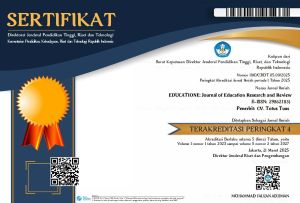CULTIVATING A POSITIVE MINDSET IN HEMODIALYSIS PATIENTS: A PHENOMENOLOGICAL STUDY AND ITS IMPLICATIONS FOR HEALTH EDUCATION
DOI:
https://doi.org/10.59397/edu.v3i2.55Keywords:
cognitive behavioral therapy, hemodialysis, positive mindset, psychological resilience, phenomenologyAbstract
Hemodialysis is a vital therapy for patients with end-stage chronic kidney disease (CKD), yet it often imposes significant psychological and social burdens, including stress, depression, and a diminished sense of autonomy. While prior studies have highlighted the benefits of fostering a positive mindset in chronic care, little is known about the internal processes through which patients cultivate such resilience. This study aims to explore the lived experiences of hemodialysis patients in developing a positive mindset and to analyze its role in enhancing their quality of life. Using a qualitative research design with a descriptive phenomenological approach, data were collected through in-depth, semi-structured interviews with ten purposively selected patients at Blambangan Hospital, Indonesia. Data were analyzed using Colaizzi’s method, ensuring rigorous and participant-centered thematic extraction. The findings revealed four interrelated themes: (1) awareness and self-acceptance, reflecting emotional transition from denial to constructive adaptation; (2) family support, both emotional and practical, which bolstered motivation and treatment adherence; (3) trust in medicine and spiritual engagement, which helped patients find inner peace and existential meaning; and (4) focus on controllable aspects of daily life, enabling self-regulated health behavior and increased agency. These themes converged into a holistic framework where psychological, social, and spiritual domains interacted synergistically to build resilience and foster emotional well-being. This study underscores the importance of integrating cognitive-behavioral interventions, family involvement, and spiritual support within hemodialysis care. It also offers insights for educational institutions to reform health curricula and for healthcare systems to adopt interdisciplinary, patient-centered approaches. Future research should explore comparative and longitudinal studies to assess the effectiveness of psychological and spiritual interventions across cultural and religious contexts in chronic care populations.
Downloads
Published
How to Cite
Issue
Section
Citation Check
License
Copyright (c) 2025 EDUCATIONE

This work is licensed under a Creative Commons Attribution 4.0 International License.



















